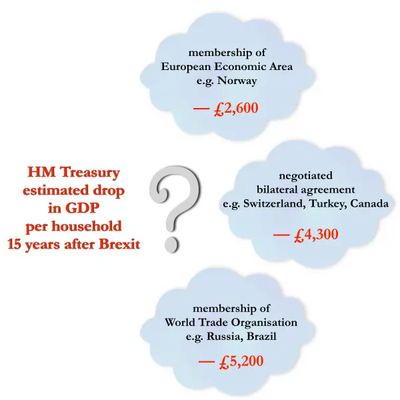HM Treasury assesses potential economic damage of Brexit

HM Treasury has today published an analysis of the long-term economic impact of European Union membership and of the three main alternatives should the UK vote to leave the EU in June's referendum. Their analysis shows that each of the three Brexit routes would damage Britain's economy over the next fifteen years, reducing productivity and GDP per capita -- in fact, the conclusion is that "the UK would be permanently poorer if it left the EU". The Treasury argues that weakened tax receipts would outweigh any potential savings from reduced financial contributions to the EU post-Brexit. Taking as an example the middle-ranked Brexit option, in terms of economic impact, a negotiated bilateral agreement would (after 15 years) result in a reduction of £36 billion per year -- the equivalent of 8p on the basic rate of income tax.
In the introduction to the published document, George Osborne writes: "The conclusions of this document are clear: none of the alternatives support trade and provide influence on the world stage in the same way as continued membership of a reformed EU; and all of them come with serious economic costs that would affect businesses, jobs, living standards and our public nances for decades to come. To put it simply, families would be substantially worse off if Britain leaves the EU."
